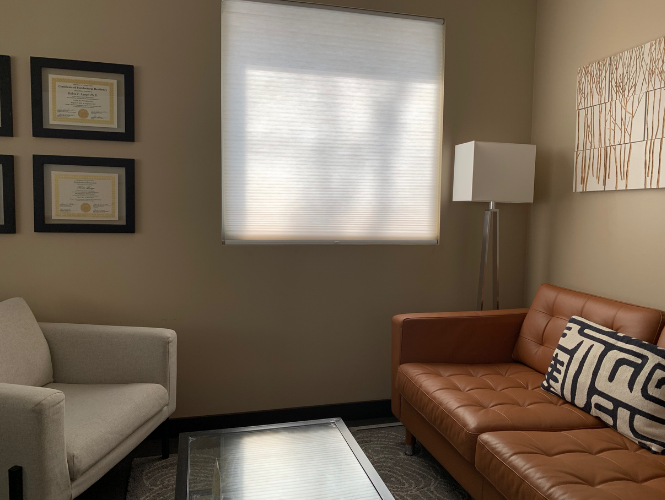Our process for starting treatment is designed to help you find the right match in terms of both therapist and treatment program.
PLEASE NOTE:
• If you are an existing UCEBT client who is seeking additional services with us, please contact us at 801-419-0139.
• We currently do not have a waitlist for our sliding scale services.
Step 1: Complete Our Online Questionnaire
This secure form will allow us to learn about you, your treatment preferences, and alert our Client Coordinator of your interest. After you complete the questionnaire if at any point you find yourself in need of urgent mental health support, here is a list of community Mental Health Crisis resources. If you would prefer to provide your information over the phone instead, please contact our Client Care Manager at 801.419.0139 option 2.
Step 2: Client Care Phone Call
After you complete your online questionnaire, you will be contacted by our Client Care Coordinator for an initial phone call. This initial phone call will take 5-10 minutes, depending on the number of questions you have. During that call, we will provide you with an overview of the services we provide, including fees and payment. We will also describe the purpose and limits of our initial assessment and provide referrals to other therapists if you are interested in other options or not a fit for our services. We will review your initial questionnaire and this information will be discussed in our interdisciplinary treatment team meeting where you will be personally matched with a provider for the initial intake assessment.
Step 3: Optional Free Consultation
Because choosing a therapist is a very important decision, we also offer free consultations as an opportunity for you to come to our facility, learn more about our treatment programs, and decide whether to schedule an initial assessment. The free consultation does not obligate you to therapy; it is simply part of making an informed decision. We believe that informed decision making improves the likelihood that therapy will succeed, even if you don't choose our services. The free consultation is optional and you do not need to complete the free consultation in order to start treatment at UCEBT. If there are other people involved in your decision (a spouse, friend, parent, or other family members) they are welcome, but not required, to attend this appointment. Free consultation lasts 30 minutes.
Here's a quick video that may be helpful as you prepare for your free consultation:
Step 4: Comprehensive Intake Assessment
The intake assessment takes a total of approximately two hours, which includes 30 minutes of pre-appointment paperwork and a 90-minute interview with the intake therapist. Some clients decide to schedule the assessment during the free consultation, while others choose to call back at a later time. Importantly, the initial assessment also does not obligate you to treatment. After your initial 90-minute intake, you will be scheduled for a 45-minute feedback appointment. During the feedback appointment, you will have a chance to discuss the results and ask questions. The feedback may include referrals to services outside of our center if we see that your needs may be addressed better elsewhere. The information from your intake assessment can be taken to other providers if you find someone else that better suits your needs.
Consistent with evidence-based practice, initial assessment is the foundation of effective therapy. Most clients describe our initial assessment as being very different from that of previous therapists--ours is less conversational. This style of intake allows us to identify your concerns more quickly and begin your treatment protocol sooner in therapy, usually by the first or second session. Prior to attending your intake, you will need to complete pre-assessment paperwork. This paperwork typically takes about 30 minutes to complete. This paperwork will be sent ahead of your appointment and will ideally be completed 48 hours before your intake assessment. In your paperwork and your intake interview, you will answer many questions about potential difficulties and strengths. Your intake therapist will review your pre-assessment paperwork and will have follow-up questions that will help to clarify your diagnosis and treatment. After your initial assessment is completed, your intake provider and consultation team will evaluate your pre-assessment paperwork and intake interview to determine the best course of treatment.
Step 5: Beginning Therapy
In your first session, we will discuss your assessment results, describe the available treatment protocol(s), refer you to the scientific literature for your treatment, describe the typical treatment duration and the range around that duration, answer your questions, and schedule your first four therapy appointments. We will also introduce elements of the therapy we are recommending. Your first session will typically last 90 minutes. Subsequent session length will depend upon the specific treatment for your presenting problems. Most cognitive behavior therapies require weekly 50 minute sessions.
Step 6: Committing to the Work
Most people take a few weeks to decide if therapy is right for them. Our clients often have many competing demands for their time or have varying experiences with prior therapists. We are aware that you are evaluating us and that you may decide not to pursue therapy in our clinic. We invite you to work with us for 4-6 weeks before you decide. Therapy is a lot like going to a personal trainer. The work is not always comfortable, but the results are worth the effort. Within the first 4-6 weeks, you should have a sense of whether the therapy matches your goals, and if your therapist is a collaborative guide in helping you reach those goals.
Step 7: Make an Informed Decision
We want you to make an informed decision about your treatment. You should select your treatment setting carefully and consider all options available in the community, each of which have benefits and drawbacks. We respect your ability to make a business decision about therapy. Therapy is an investment in your future, and we want you to choose wisely.



